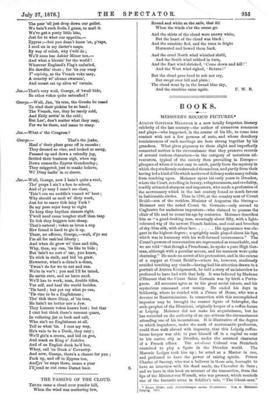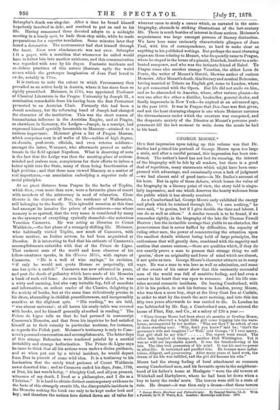BOOKS.
MELSSNER'S ROCOCO PICTURES.*
AUGUST Gorruse MEISSNER is a now totally forgotten literary celebrity of the last century—the author of numerous romances and plays—who happened, in the course of his life, to come into contact with not a few persons of note, and whose desultory reminiscences of such meetings are here strung together by his grandson. What gives piquancy to these slight and imperfectly connected notices is the circumstance that they preserve records of several curious characters—in the category of notorious ad- venturers, typical of the society then prevailing in Europe— glimpses of whom it is not easy to catch, partly from the mystery in which they studiously enshrouded themselves, and partly from their having led a kind of life which motives of delicacy make many refrain from touching upon. Meissner spent his early years in Dresden, where the Court, revelling in luxury, voluptuousness, and credulity, readily attracted sharpers and impostors, who made a profession of the necromancy which in the last century found so much favour in fashionable circles. Thus in 1780, at the country seat of Count Brahl—son of the reckless Minister of Augustus the Strong- Meissner met the noted Count St. Germain—only second to Cagliostro for audacious imposture—who claimed to possess the elixir of life and to count his age by centuries. Meissner describes him as "a good-looking man, seemingly about fifty, with a light- coloured wig of the newest French fashion, and coat and breeches of sky-blue silk, with silver lace His appearance was ele- gant in the highest degree ; a sprightly smile played about his lips, which was in harmony with his well-formed countenance." The Count's powers of conversation are represented as remarkable, and we are told "that though a Frenchman, he spoke a pure High Ger- man, although with a peculiar accent, and his manners were quite charming." He made no secret of his pretensions, and in the course of a supper at Count Bruhn—where he, however, studiously avoided touching any viands—having had his attention drawn to a portrait of Aurora Konigsmarck, he told a story of an interview he professed to have had with that lady. It was believed by Madame d'Hausset that the Count Saint Germain was by birth a Portu- guese. All accounts agree as to his great social talents, and his mysterious command over money. He ended his days in Schleswig, where he resided with a Prince of Hesse, who was a devotee to Rosicrucianism. In connection with this accomplished impostor may be brought the coarser figure of Schrepfer, the arch-prophet of the Illuminati, originally keeper of a coffee-house at Leipzig. Meissner did not make his acquaintance, but he has recorded on the authority of an eye-witness the circumstances attending one of his incantations. It is illustrative of the degree to which impudence, under the mask of necromantic profession, could then walk abroad with impunity, that this Leipzig coffee- house keeper was able to pass himself off in a capital so near to his native city as Dresden, under the assumed character of a French officer. The soi-disant Colonel von Steinbach
contrived to play a figure in the Dresden world. The Masonic Lodges took him up ; he acted as a Master in one, and professed to have the power of raising spirits. Prince Charles of Saxony, who was a believer in these arts, besought to have an interview with his dead uncle, the Chevalier de Saxe ; and we have in this book an account of the transaction, from the lips of the Minister von Wurndt, who was present, which reminds one of the fantastic scene in Schiller's tale, "The Ghost-seer."
* Rococo Rieder, molt Aufzeichnuspen mdnea Grouoaiers. Von A. Meissner. Leipzig. 1877. Schrepfer's death was singular. After a time he found himself hopelessly involved in debt, and resolved to put an end to his life. Having summoned three devoted adepts to a midnight meeting in a lonely spot, he bade them step aside, while he made preparations for a superior revelation. Some minutes later they heard a detonation. The necromancer had shot himself through the heart. Even now charlatanerie was not over. Schrepfer Lft a paper, with a monition that whomever he called would have to follow him into another existence, and this communication was regarded with awe by his dupes. Fantastic incidents and credulous practices of this nature illustrate aptly the weird scenes which the grotesque imagination of Jean Paul loved to evoke, notably in Titan.
It is curious to note the extent to which Freemasonry then prevailed as an active body in Austria, where it has since been so rigidly proscribed. Meissner, in 1785, was appointed Professor of Classical Literature in the Prague University by Joseph IL, a nomination remalkable from his having been the first Protestant promoted to an Austrian Chair. Formerly this had been a Jesuit seminary, but the reforming hand of Joseph had changed the character of the institution. This was the short season of humanitarian influence in the Austrian Empire, and at Prague, as elsewhere in Germany, the Lodges—Joseph, in a rescript, had expressed himself specially favourable to Masonry—attained to a curious importance. Meissner gives a list of Prague Masons, which comprises men in all walks of life—nobles of high degree, ex-Jesuits, professors, officials, and even veteran soldiers— amongst the latter, Wurmser, who afterwards proved so unfor- tunate in the field against Napoleon. What is deserving of note is the fact that the Lodge was then the meeting-place of serious- minded and zealous men, conspicuous for their efforts to infuse a better spirit into the State, many of them being functionaries of high position ; and that these men viewed Masonry as a matter of real importance,—an association embodying a superior code of social principles.
At no great distance from Prague lie the baths of Topaz, which then, even more than now, were a favourite place of resort with members of the aristocracy in need of relaxation. Close thereto is the chateau of Dux, the residence of Wallenstein, still belonging to the family. This splendid mansion at this time had amongst its inmates the prince of adventurers—one whose memory is so spotted, that the very name is considered by many as the synonym of everything cynically shameful—the notorious Venetian Casanova. He was acting as librarian to Count Waldstein,—the last phase of a strangely shifting life. Meissner, who habitually visited Tiiplitz, saw much of Casanova, with whose mother, an Italian actress, he had been acquainted at Dresden. It is interesting to find that his estimate of Casanova's accomplishments coincides with that of the Prince de Ligne. That eminent man of the world and keen observer of his fellow-creatures speaks, in his (Enures Meles, with rapture of Casanova. "He is a well of wise sayings," he exclaims, "if only he would not quote Horace so perpetually, till one has quite a surfeit." Casanova was now advanced in years, and past the deeds of gallantry which have made of his Memoirs a book of such evil fame. As seen in Meissner's sketch, he was a witty and amusing, but also very irritable fop, full of anecdote and information, an ardent reader of the Classics, delighting in the society of books, but at the same time ridiculously precise in his dress, abounding in childish punctiliousness, and inexpressibly sensitive at the slightest quiz. "His reading," we are told, "was almost universal ; at all hours his study-table was covered with books, and he himself generally absorbed in reading." The Prince de Ligne tells us that he had perused in manuscript Casanova's Memoirs, and that from his inquiries be had satisfied himself as to their veracity in particular sections, for instance, as regards the Polish part. Meissner's testimony is only to Casa- nova's personal conversation and accomplishments. The latter days of this strange Bohemian were rendered painful by a morbid irritability and strange hallucination. The Prince de Ligne says he came to think that all his actions were under a divine guidance, and so when put out by a trivial incident, be would depart from Dux in pursuit of some wild idea. It is a testimony to his fascination that the sorely tried patience of Count Waldstein never deserted him ; and so Casanova ended his days, June, 1798, at Dux, his last words being, "Almighty God, and all you present, 'witnesses of my death, I lived as a philosopher, and I die as a Christian." It is hard to obtain distinct contemporary evidence to the facts of this strangely erratic life, the disreputable incidents in the Memoirs making the book one only to be kept under lock and key ; and therefore the notices here dotted down are of value for
whoever cares to study a career which, as narrated in the auto- biography, abounds in striking illustrations of the last-century life. There is much besides of interest in these notices. Meissner'& acquaintance was large amongst persons of literary distinction.. We have here some eminently characteristic glimpses of Jean Paul, with bits of correspondence, as hard to make clear as. anything in his published writings. But perhaps the most charming pages are those relating to Mozart, who frequently came to Prague, where he stayed in the house of a pianist, Duschek, brother to a cele- brated composer, and who was the intimate friend of Rebel. To Prague came also another strange Venetian, the abbot Leon de Ponte, the writer of Mozart's libretti, likewise author of curious Memoirs. After Mozart's death, this literary and musical Bohemian, having married at Trieste an English girl, came to London, where he got connected with the Opera. But life did not smile on him, and so he absconded to America, where, after various phases—he was one after the other a distiller, bookseller, general dealer, and finally impresario in New York—he expired at an advanced age,- in the year 1838. It was in Prague that Don Juan was first given, and not the least charming chapter is one where Meissner narrates the circumstances under which the overture was composed, and the desperate anxiety of the Director at Mozart's perverse post- ponement till the last moment to write down the music he had in his head. 1



































 Previous page
Previous page